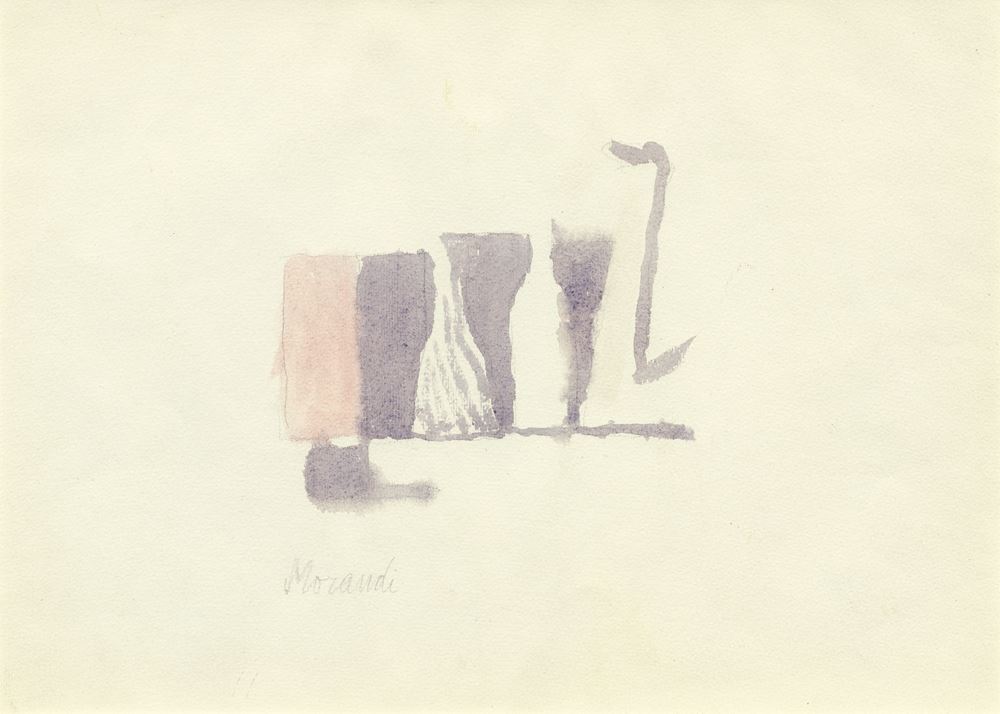
Lot 3242* - A183 Impressionist & Modern Art - Friday, 08. December 2017, 04.00 PM
GIORGIO MORANDI
(1890 Bologna 1964)
Natura morta. 1959.
Watercolour on paper.
Signed lower left: Morandi.
27 x 37 cm.
According the catalogo generale Giorgio Morandi himself authenticated this work 16 June 1963 and registred it under the number 708 in the archive.
Provenance:
- Private collection Turin, Italy.
- Collection Emil Frey, Germany, by descent to the present owner.
Exhibitions:
- Kaiserslautern 1976, Kunst des 20. Jahrhunderts aus der Sammlung F., Pfalzgalerie Kaiserslautern, 15 February - 14 March 1976, no. 233.
- Kiel 1974, Aquarelle, Zeichnungen und Druckgrafik des 20. Jahrhunderts aus der Sammlung eines Kielers, Ausstellung zum 100. Jubiläum der Schleswig-Holsteinischen Landesbrandkasse, Kunsthalle Kiel, 3 February - 3 March 1974, no. 114.
- Ludwigshafen am Rhein 1970, Idee und Wirklichkeit, Handzeichnungen und Aquarelle des 20. Jahrhunderts aus Privatbesitz, Austellung im Bürgermeister-Ludwig-Reichert-Haus Städtische Kunstsammlungen Ludwigshafen am Rhein, 11 October - 1 November 1970, no. 128.
- Hannover 1964, Morandi, Kestner-Gesellschaft 1964, no. 23.
Literature:
- Pasquali, Marilena: Morandi. Aquarelli - Catalogo generale, Mailand 1991, no. 1959/27, p. 120 (with ill.).
The fact that the still-life belongs to Morandi, like the brush belongs to the painter, is reflected in the artist's catalogue raisonné. Dedicating the bulk of his career to still-life elements, he mainly portrayed bottles, glasses and vessels of everyday use more than any other artist, which amongst other things earned him the nickname "the bottle painter".
The artist was influenced by his Italian forefathers of the Quattrocento. Among them, Masaccio, Paolo Uccello and Pierro della Francesco were the most important: their frescos' simple, coherent structure, combined with a virtually sculptural depiction of volume, had a formative influence on Morandi. He also tried to orientate himself on Modern masters such as Cézanne, and eventually managed to create his own art with a highly recognisable quality.
For Morandi, the ultimate goal was the arrangement of the vessels and the creation of a perfect and harmonious composition in the process. The peaceful tranquillity that suffuses his work is underscored by his special colour palette made up of earthy tones.
The works offered in our auction beautifully show the artist's creative process. Pencil works and watercolours are very important components of the artist's development and ultimately lead to the final oil paintings. The pencil work serves to find the composition and the watercolour to eventually find the colour harmony. This underscores the fact that Morandi was a very precise artist who strove for perfection.
Provenance:
- Private collection Turin, Italy.
- Collection Emil Frey, Germany, by descent to the present owner.
Exhibitions:
- Kaiserslautern 1976, Kunst des 20. Jahrhunderts aus der Sammlung F., Pfalzgalerie Kaiserslautern, 15 February - 14 March 1976, no. 233.
- Kiel 1974, Aquarelle, Zeichnungen und Druckgrafik des 20. Jahrhunderts aus der Sammlung eines Kielers, Ausstellung zum 100. Jubiläum der Schleswig-Holsteinischen Landesbrandkasse, Kunsthalle Kiel, 3 February - 3 March 1974, no. 114.
- Ludwigshafen am Rhein 1970, Idee und Wirklichkeit, Handzeichnungen und Aquarelle des 20. Jahrhunderts aus Privatbesitz, Austellung im Bürgermeister-Ludwig-Reichert-Haus Städtische Kunstsammlungen Ludwigshafen am Rhein, 11 October - 1 November 1970, no. 128.
- Hannover 1964, Morandi, Kestner-Gesellschaft 1964, no. 23.
Literature:
- Pasquali, Marilena: Morandi. Aquarelli - Catalogo generale, Mailand 1991, no. 1959/27, p. 120 (with ill.).
The fact that the still-life belongs to Morandi, like the brush belongs to the painter, is reflected in the artist's catalogue raisonné. Dedicating the bulk of his career to still-life elements, he mainly portrayed bottles, glasses and vessels of everyday use more than any other artist, which amongst other things earned him the nickname "the bottle painter".
The artist was influenced by his Italian forefathers of the Quattrocento. Among them, Masaccio, Paolo Uccello and Pierro della Francesco were the most important: their frescos' simple, coherent structure, combined with a virtually sculptural depiction of volume, had a formative influence on Morandi. He also tried to orientate himself on Modern masters such as Cézanne, and eventually managed to create his own art with a highly recognisable quality.
For Morandi, the ultimate goal was the arrangement of the vessels and the creation of a perfect and harmonious composition in the process. The peaceful tranquillity that suffuses his work is underscored by his special colour palette made up of earthy tones.
The works offered in our auction beautifully show the artist's creative process. Pencil works and watercolours are very important components of the artist's development and ultimately lead to the final oil paintings. The pencil work serves to find the composition and the watercolour to eventually find the colour harmony. This underscores the fact that Morandi was a very precise artist who strove for perfection.
CHF 50 000 / 70 000 | (€ 51 550 / 72 160)
Sold for CHF 116 900 (including buyer’s premium)
All information is subject to change.

